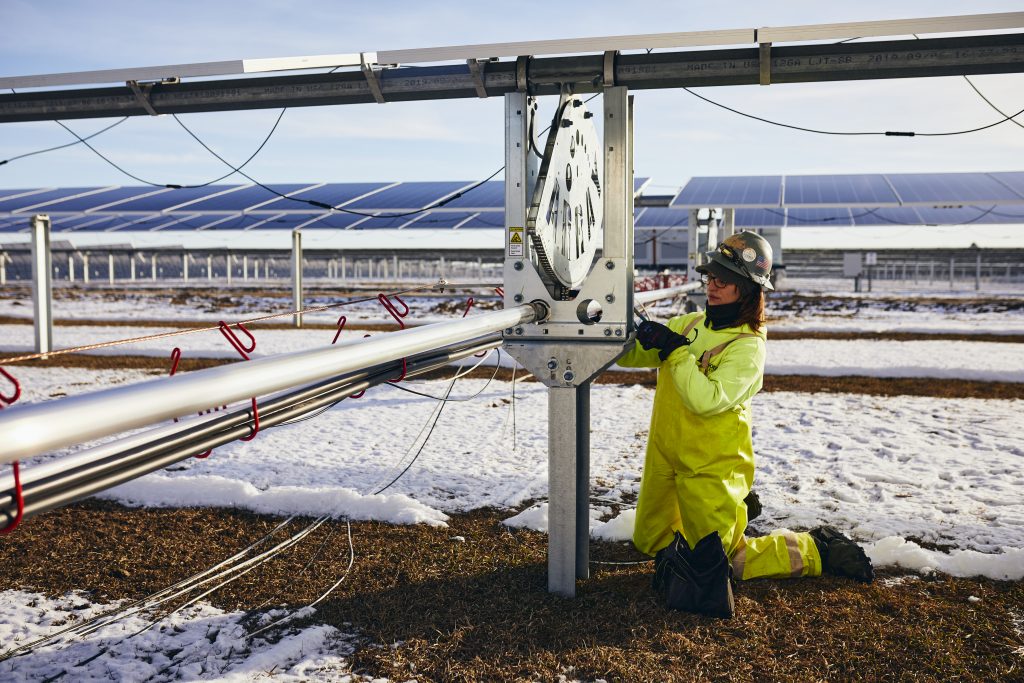Penn State and Lightsource bp recognized for their partnership designed to be a national blueprint for sustainability innovation
Penn State and Lightsource bp awarded APPA 2020 Sustainability Innovation Award for their work together to maximize the sustainability benefits of solar farming in the U.S.
above image is a bird’s-eye view of Nittany 3, one of the three sites for this project
The solar energy partnership between Penn State and Lightsource bp has been awarded the 2020 Sustainability Innovation Award by APPA, the professional association dedicated to best practices in educational facilities. Together, Penn State and Lightsource bp have built a national model for sustainability through one of the largest solar energy projects in rural Pennsylvania.
The innovative partnership began in February 2019 when Penn State and Lightsource bp announced the development of the 70-megawatt large scale offsite solar project across three locations in Franklin County. Construction of the solar project reached completion during the summer of 2020 and in October 2020, Penn State began purchasing renewable energy generated from the sites. In total, the three sites will produce over 100 million kilowatt-hours of electricity in year one, supplying 25% of the University’s state-wide electricity needs and lowering Penn State’s greenhouse gas emissions by 57,000 mtCO2e per year, or the equivalent of removing 12,100 fuel-burning cars from the road. Estimated cost savings for Penn State equate to $272,000 annually and more than $14 million over the 25-year contract term.
In addition to the carbon reduction benefits and energy savings, the solar project is fostering education and bringing real-world experience into the classroom. More than fifty Penn State students studying a variety of majors, including business, engineering, and marketing have experienced, and will continue to have access to learning, research and internship opportunities related to the solar project. Lightsource bp has provided the flexibility of working with students physically and virtually, giving students the opportunity to learn despite the challenges brought on by the pandemic.

Lightsource bp has a unique approach to its solar projects – a customized Environmental Management Plan (EMP) is developed for each site to minimize the effect to the land as well as increase biodiversity, improve soil health, and provide pollinator friendly environments wherever possible. Now that the solar farms have completed construction, they are relatively untouched, providing a haven for species-rich grass, herbs, butterflies, wildflowers, bees, and other wildlife that call the area home.
All three sites were seeded with a specially formulated seed mix aptly named Fuzz and Buzz. Developed by the American Solar Grazing Association (ASGA) in partnership with Ernst Conservation Seeds and Pollinator Service, Fuzz and Buzz was specifically designed for solar sites to support grazing, and biodiverse enough to support a range of pollinators. One of the sites will begin supporting solar grazing activities in the spring of 2021. Penn State will use these initiatives as opportunities for research.
Lightsource bp is proud to work alongside Penn State to further their sustainable goals. Lightsource bp and Penn State are looking forward to growing together through this partnership to create a healthier, more sustainable future for the state of Pennsylvania.
Related news
19 Feb, 2026
Be a good neighbour: the cornerstone of project success
Lightsource bp has a strong tradition of proactive and meaningful community engagement on our self-developed projects.
04 Feb, 2026
Energy in Focus – Safety that delivers: reducing risk and protecting long-term value
Safety is not only about protecting people – it is fundamental to how we deliver projects on time, reduce risk and protect long-term asset value across our global portfolio.
15 Jan, 2026
Lightsource bp’s hail mitigation solution showcased in the World Economic Forum’s Innovation Playbook for Future Power Systems
The World Economic Forum (WEF) launched the Innovation Playbook, showcasing practical, scalable solutions driving the transformation of global power systems.



